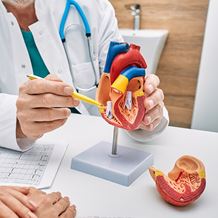What is an echocardiogram?
An echocardiogram is a type of ultrasound scan that helps examine how well your heart is working. The test does not use any radiation. Instead, high frequency sound waves create moving images which are interpreted and reviewed by your doctor. An echocardiogram is different to an electrocardiogram (ECG) which measures your heart’s electrical activity.
The echocardiogram images show how your blood moves through your heart chamber and heart valves, so that your doctor can understand more about how your heart is functioning. It can help diagnose or monitor many types of heart condition such as cardiomyopathy, congenital heart disease, pulmonary hypertension, coronary artery disease, heart valve disease, inflammation, and signs of heart failure.
The test can take up to one hour and there are different types of echocardiograms available depending on your specific condition. These include:
Transthoracic echocardiogram – Also known as a heart ultrasound, this non-invasive test is the most common type of echocardiogram used to examine the function of the heart and valves. Images are created by placing a probe on your left chest wall.
Transesophageal echocardiogram – Inserting a tube inside the oesophagus enables more detailed images from your heart. This is performed while you are asleep using a general anaesthetic.
Doppler ultrasound – Used to check the flow of blood and look for blockages as well as identify heart and valve problems.
Stress echocardiogram – Patches are attached to your chest while exercising to collect information on how your heart responds under stress.
Foetal echocardiogram – A non-invasive test to check the heart health of an unborn child.
Why do I need it?
Your doctor may recommend an echocardiogram if something unusual has been discovered in another test such as an ECG, or to check on an existing heart condition such as heart valve disease. You may also need an echocardiogram if you have been experiencing symptoms that suggest there may be a problem with your heart:
- An irregular heartbeat (arrhythmia) or heart murmur
- Breathlessness
- High or low blood pressure
- Swelling
What does it test for? What does it show?
Echocardiograms provide live images of your heart to test for existing and high-risk conditions. It can diagnose structural changes, blood clots, blocked arteries, and heart valve defects amongst many other conditions.
What's next?
If you have been experiencing heart-related symptoms, book an appointment with our cardiac services specialist today.
Our specialists in Cardiac Services
View all specialists






